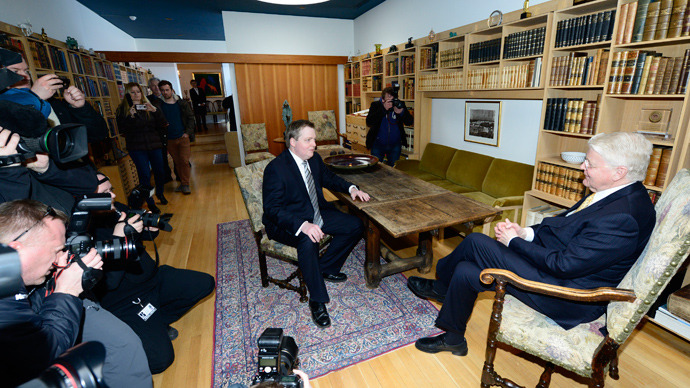Iceland’s economic thaw a thorn in EU’s side

Iceland just elected the parties which plunged them into crisis only five years ago. Is it casino capitalism all over again, or just a slap in the face of the EU?
In terms of redemptive electoral stories, the return of the
Independence Party in Iceland is quite significant, albeit that
they will come back to government with only a few percentage points
more votes than they polled at their nadir in the depths of the
Icelandic crisis in 2009.
However the biggest winner was Sigmundur Gunnlaugsson, the leader of the Progressive Party, who propelled his party to hold 19 seats (same as the Independence Party) with 24.4 versus 26.7 per cent of the vote respectively. The parliament (Althing) has 63 seats, so the two leading parties have a comfortable working majority against a dissipated opposition which includes two new parties.
True, the political class is not exactly enjoying a ringing endorsement. True, 83.3 per cent voted, but that turnout was the lowest since independence from Denmark in 1944. Politicians are only trusted by 15 per cent of the population. Unsurprisingly, only bankers fare worse.
At the inflection point of the crisis, Iceland introduced
capital controls and stinging austerity, but it also had a tool up
its sleeve which struggling Mediterranean nations cannot take
advantage of. Whereas they are imprisoned in the euro, the
Icelanders let their krone collapse.
Icelandic companies diligently sought to export their cheaper goods. Meanwhile, hordes of non-Viking raiders arrived and exported secondhand cars and other goods to Scandinavia and Eastern Europe, adding some liquidity to the Icelandic economy at its bottom. Compare that with Spain or Italy, where the euro has inflated the price of everything to levels which render these countries less competitive. An acute failure in a competitive globalized world.
The Progressive Party in particular gained in the election
thanks to Gunnlaugsson’s resolute approach to the crisis. While
declining socialist UK Prime Minister Gordon Brown railed
impotently, demanding recompense for British depositors in the
collapsed Icesave Bank, Gunnlaugsson even in opposition was a firm
opponent of any repayment. Now the new government is likely to
enforce severe losses and write-downs on creditors to the Icelandic
banks.
Devaluation and enforced losses on creditors won’t make Iceland
much more popular within the EU, but then again the EU’s rather
arrogant attitude towards Iceland’s membership of the zone helped
force a dramatic turnaround in sentiment away from the pro-European
integration government, which was roundly defeated at the weekend.
Part of the reason for that defeat lay in Brussels’ demonstrating
the worst of monarchical/imperial arrogance in expecting
hard-pressed Icelanders to be utterly supplicant to the daft dogmas
of myopic Europhilia.

Ultimately the EU, stuck in a bipolar world view of the US and EU as the only major trade blocs, was entirely wrong-footed as the Icelanders opted to find a third way solution. This unique approach has involved a closer relationship with China (which covets mineral rights in the Arctic Circle, to which Reykjavik has considerable access) and has raised eyebrows in Western capitals. However, with Obamaland apparently unaware of what Iceland is, Britain and Holland demanding banking reparations in desperate political grandstanding moves while the EU overall behaved like a medieval fiefdom having defeated a barbarian nation, is it altogether surprising that the Icelanders opted for a path which largely ignores the West?
It was hardly difficult to see the Icelandic expansion for what it was - a crazed bubble - but just like the Baltic States at the time, stating that the emperor had no clothes was a rapid path to being ostracized! However, when a nation of 320,000 had control of multiple shop chains in the highly-competitive UK high street and was acquiring trophy assets such as English Premier League clubs, it was hardly difficult to ponder whether a banking sector 10 times national GDP was really sustainable!
Now, Icelanders have opted for the lure of austerity relief on their inflation-linked mortgages and hope the right wing parties can do what they have done in the past: deliver growth, while avoiding the excesses of the bubble years (where Britain/America and the entire EU were complicit in trying to inflate the unsustainable).
...oh and if you think this election result is just a little
blond exceptionalism in the North Atlantic, check out the recent
Irish opinion polls...
The statements, views and opinions expressed in this column are solely those of the author and do not necessarily represent those of RT.
The statements, views and opinions expressed in this column are solely those of the author and do not necessarily represent those of RT.













